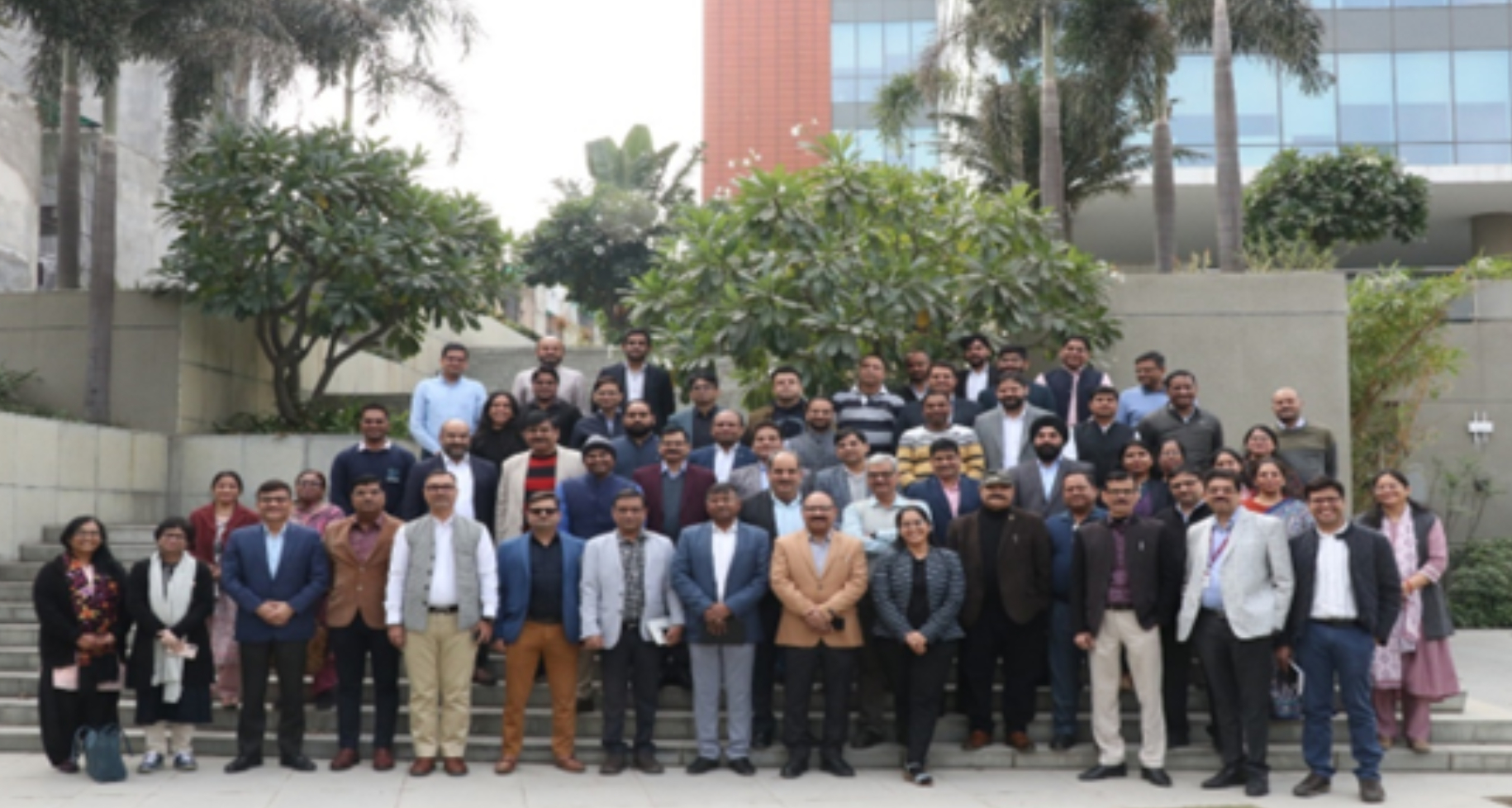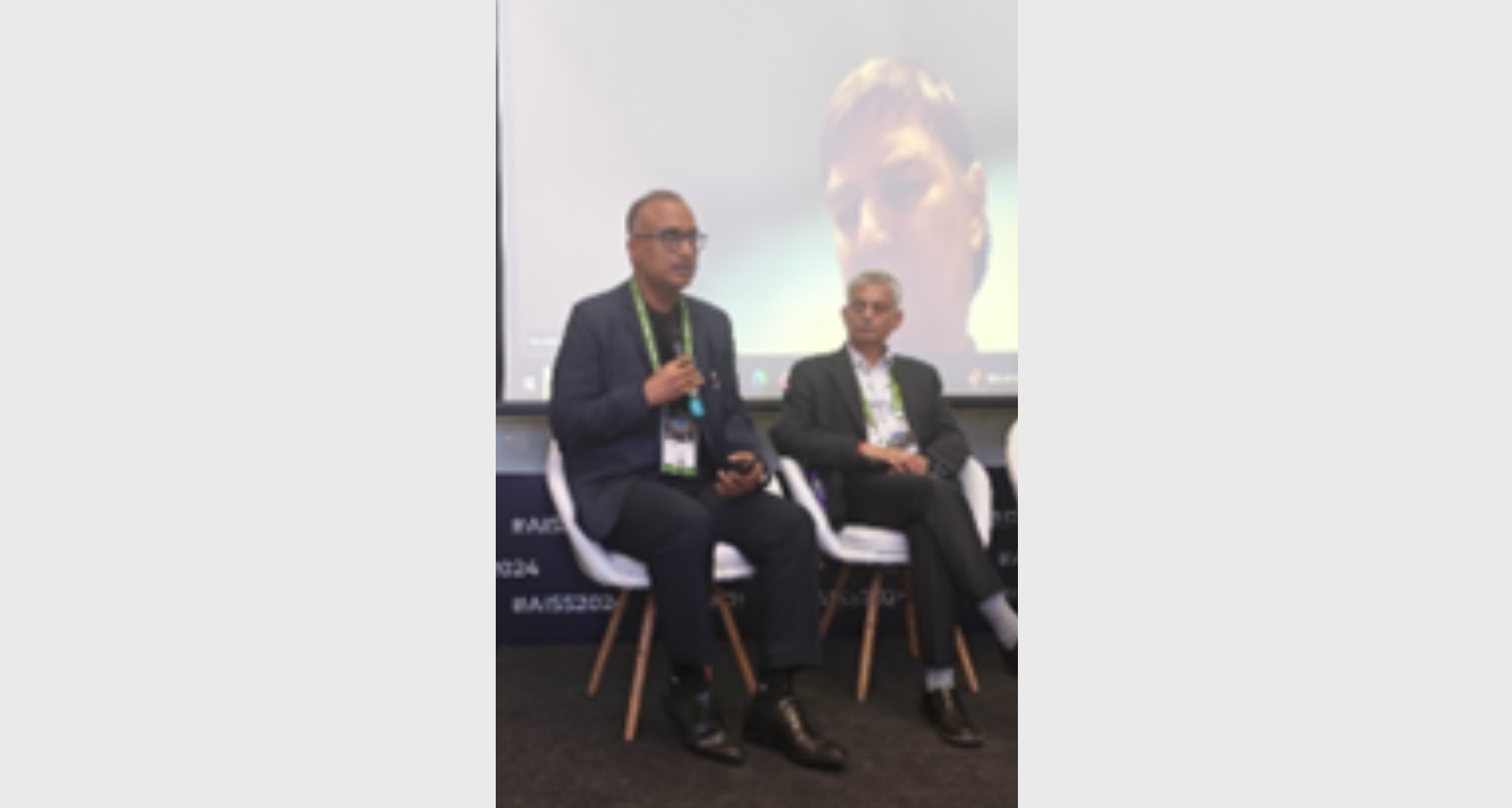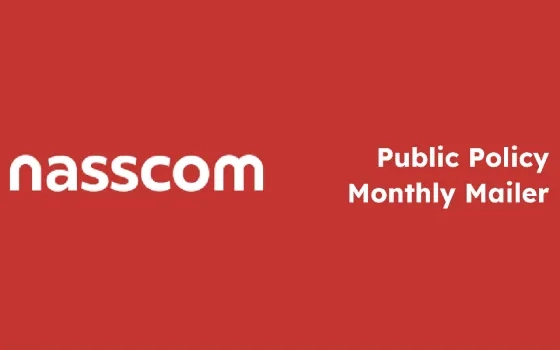 |
Public Policy
Monthly Mailer |
|
| January 2025 |
Vol 7, Issue 1 |
|
 |
| MOCI | Extension of flexible hybrid working model in the SEZs for IT industry for 3 years |
| On December 26, 2024, MOCI extended the hybrid working model facility in SEZs for the IT industry until December 31, 2027. The previous notification from November 7, 2023, allowed this flexibility only until December 31, 2024. Based on industry feedback, we had requested for a longer-term extension, rather than the annual extension that were granted in previous years. The continuation of this facility ensures the much-needed ease of doing business for the industry. (Read more) |
| MOF | Meeting with FM to discuss suggestions for Union Budget 2025-26 |
Nasscom participated in a pre-budget consultation meeting with the Hon'ble Finance Minister to discuss our suggestions for the Union Budget 2025-26 in detail. A detailed memorandum has been submitted to the government. At this meeting, we focused on the following two suggestions:
- International taxation for GCCs and MNEs:
In response to our earlier recommendation, the Union Budget 2024 had in July announced the decision to make safe harbour rules attractive and streamline transfer pricing assessment procedure. At this meeting, we discussed specific measures that need to be implemented, as follow-up to the announcement, to enhance the ease of doing business and provide greater tax certainty to the growing ecosystem of GCCs and tech MNEs in the country:
- Safe Harbour Rules - Increase the eligibility threshold, reduce the profit margin rates and club the rate categories to two or one.
- Advance Pricing Agreements - Reduce the time taken to conclude APAs and reduce the timelines for renewal of APAs where the facts are substantially the same.
- DeepTech Start-ups:
- India is currently home to over 3,600 DeepTech startups, with approximately 500 launched in the last year. These span across space, defence, automotive, health, industrial and manufacturing, environment, cybersecurity etc. A strong DeepTech Start-up ecosystem in India can:
- Enable Global Winners in Key Commercial Segments (e.g., EV batteries, Space Tech, Biotech, selective AI companies).
- Support DeepTech Critical for India in areas like defence (e.g., drones, sensors), agricultural biotech (e.g., climate-resilient seeds), biosafety (e.g., vaccines), quantum computing, climate tech.
While things have improved at the seed funding stage, there is a significant gap at series A and B level. For this, we discussed the merits of a government backed DeepTech fund. Given the long gestation period and investments needed – a government supported fund which can attract an equal support from the private investors can help accelerate the DeepTech ecosystem. Measures in this direction can be one of the ways to boost R&D investments in the country. This can also help address strategic national needs and build expertise, even in markets with low immediate commercial potential.
|
|
 |
| MOCI | Meeting to discuss measures for boosting exports from India |
We had a meeting with Secretary, MOCI on December 24, 2024, to discuss specific measures for boosting services exports from India. As part of our suggestions, we highlighted certain operational issues being faced by units in SEZ. These include:
- Suggestions under the safe harbour and advance pricing agreements under the transfer pricing regime,
- Need to allow INR billing for supply of services in DTA,
- Simplifying the process of service invoice endorsement under GST, and
- A change in the depreciation period for non-computer equipment, amongst others.
The discussion also covered significant non-tariff barriers in international markets, such as Singapore's new points-based employment pass system, policy space with respect to H1-B visa in the US, and lack of social security agreements with our key export markets, namely US and UK. |
| GST | Knowledge sharing session on e-commerce for GST officials from Uttar Pradesh |
 |
| Nasscom, in collaboration with the UP Technical Education Department, conducted a half-day session on e-commerce for senior GST officials from Uttar Pradesh. This was in continuation to similar initiatives for Maharashtra, Punjab, and Gujarat. The session, attended by 1,000 officials online and 50 in-person, focused on analysing the e-commerce industry's business model in the context of GST, including marketplace dynamics and supply chain issues. It also covered the online travel agency model. E-commerce was identified as a priority for capacity building by the GST Audit Committee at the 48th GST Council meeting in 2022, making these sessions crucial for facilitating ease of doing business. |
| MEITY | Call for inputs on power requirements of DCs |
Nasscom is working closely with industry and MEITY towards measures to boost the DC ecosystem in India, with a special focus on AI DCs. Pursuant to this, nasscom participated in meetings convened by MEITY along with industry and other government stakeholders like, MOP and MNRE. The objective of the deliberations is two-fold:
- To understand current and projected power requirements of DCs given growing power demand of AI DCs, so going forward, MOP could engage with state government/DISCOMs to ensure that power demands of DCs are included in their planning and infrastructure upgradation exercise, and
- To identify connectivity, infrastructure and other supply chain concerns which are necessary to promote growth of DCs in India.
Currently, we are in the process of collecting input from the DC industry on power forecasting, so necessary feedback could be shared with MEITY/MOP for further engagement with state governments. For more information, please reach out to sudipto@nasscom.in. |
| EPFO | Streamlining processes |
In continuation of our ongoing efforts and previous discussions with EPFO, nasscom led an industry delegation to a meeting with CPFC to address challenges faced by the IT sector in navigating EPFO processes. Key issues highlighted by us included:
- OTP authentication complications,
- Difficulties in transferring PF accounts,
- Lack of automatic transfer for employees moving from exempted to unexempted establishments,
- Issues with Joint Declaration, and
- Discrepancies in tracking NCP for employees on foreign deputations.
Nasscom also raised concerns about mismatches in EPS status across various employments and the financial burden of interest on unsettled PF accounts. For more information, please reach out to swapnil@nasscom.in. |
| MITRA | Bike Taxi Draft Policy |
| A meeting was convened on December 24, 2024, by the MITRA to discuss the bike taxi policy of Maharashtra with the Transport Commissioner and Additional Chief Secretary (Transport) along with industry. The purpose of the meeting was to gather industry inputs on how bike taxis have been operationalised in other states like Delhi and Karnataka and assess the potential and feasibility of operating electric bike taxis by aggregators and drivers. Nasscom supported the government’s effort to provide regulatory certainty on the issue of bike taxis in the state. |
| SEBI | Meeting to discuss SDP Consultation Paper |
| We had a meeting with SEBI on December 17, 2024, to discuss our feedback on the consultation paper for recognition of SDPs. We highlighted that the interchangeable use of content and paid ads could lead to operational challenges for industry in implementing the SDP requirements. We also requested SEBI to reconsider its approach as it could set a precedent for adoption of similar approach by other sectoral regulators, creating a complex regulatory landscape for digital platforms. |
| EPFO | EPFO 3.0 Envisioning Workshop |
| The workshop, held on December 12, 2024, aimed to undertake a comprehensive review of EPFO’s current processes, focusing on the “as-is” status and identifying systemic, procedural, and regulatory challenges. The objective was to gather insights from stakeholders to address these pain points and pave the way for a more efficient, transparent, and future-ready EPFO framework. Nasscom and members attended the workshop leveraging the growing association with EPFO to shape actionable outcomes laying the roadmap for a future ready EPFO. This was a first in a series of workshops planned to envision EPFO 3.0. |
| DSCI | Annual Information Security Summit 2024 |
 |
| At the AISS 2024, Ashish Aggarwal, VP & Head of Public Policy at nasscom moderated a panel discussion on Ethics and Trust in the context of use of personal data, with Srinivas Poosarla, Group Chief Privacy Officer at Infosys; Abha Tiwari, DPO at Air India; Deepak Maheshwari, Public Affairs Advisory Board Member at Palo Alto Networks and Sébastien Ziegler, head of IoT Forum and IoT Lab, as well as Chair of the Europrivacy International Board of Experts. Ashish’s notes on the real-world examples and insights from the discussion are available here. |
 |
| TEC | Call for Inputs-Draft standard on robustness of AI systems |
| TEC has recently released draft voluntary standards for assessing and rating the robustness of AI systems in telecom networks and digital infrastructure. The draft standards focus on telecom and digital infrastructure, however, the core principles and elements of robustness in AI are sector agnostic and maybe relevant for wider applications. The deadline for public feedback on the proposed draft has been extended to January 15, 2024. Kindly provide your written inputs on the draft standard to sudipto@nasscom.in and ananya@nasscom.in before January 10, 2024. |
|
 |
| GST | Summary of decisions taken in 55th GST Council Meeting |
| The GST Council convened the 55th council meeting on December 21, 2024. The Council's recommendations include amendments to GST law entailing rate rationalisation as well as measures for facilitation of trade and streamlining compliances in GST. The proposal to issue clarification that transactions in vouchers shall be treated neither as a supply of goods nor as a supply of services is a positive clarification. Nasscom had been advocating on this issue for a couple of years, highlighting the challenges faced by companies. We are encouraged to see our efforts culminate into positive clarifications for the industry. (Read more) |
| DGFT | Import Licence Authorisation |
| Last year, DGFT had introduced restrictions on import of laptops, tablets, all-in-one personal computers, and ultra small form factor computers and servers. Based on nasscom’s feedback, DGFT allowed multiple authorisations with validity up to September 30, 2024, which on further representation from nasscom was extended till December 31, 2024. Nasscom continued to advocate on the issue with DGFT and MEITY. The DGFT has now allowed import authorisation of restricted IT hardware under IMS till December 31, 2025. Multiple applications are allowed in this year and the application portal will be open till December 15, 2025. For more information, please reach out to vertika@nasscom.in. |
| DOT | Allocation of Separate Numbering Series for Service and Transactional voice calls |
| A separate exclusive numbering series “1600” has been exclusively allotted to telemarketers to facilitate service and transactional voice calls as per the TCCCPR regulation. The Principal Entity for usage of this new series includes Government (Central/ State) and Regulators, financial entities regulated by RBI, SEBI, PFRDA, IRDA, etc. The TSP shall ensure adequate verification of each entity before assigning a number and take undertaking from the seeking entity regarding its use only for service and transactional voice calls. |
|
| APA |
Advance Pricing Agreements |
| CPFC |
Central Provident Fund Commissioner |
| DC |
Data Centre |
| DGFT |
Directorate General of Foreign Trade |
| DISCOM |
Distribution Company |
| DOT |
Department of Telecommunications |
| DPIIT |
Department for Promotion of Industry and Industrial Trade |
| DSCI |
Data Security Council of India |
| DTA |
Domestic Tariff Area |
| EPFO |
Employees' Provident Fund Organisation |
| ESOP |
Employee Stock Option Plan |
| EPS |
Employees' Pension Scheme |
| FM |
Finance Minister |
| GCC |
Global Capability Centre |
| GST |
Goods and Services Tax |
| IMS |
Import Management System |
| IN |
Indian Rupee |
| IRDAI |
Insurance Regulatory and Development Authority of India |
| IT |
Information Technology |
| MEITY |
Ministry of Electronics and Information Technology |
| MITRA |
Maharashtra Institute for Transformation |
| MNE |
Multi-National Enterprise |
| MNRE |
Ministry of New and Renewable Energy |
| MOCI |
Ministry of Commerce & Industry |
| MOF |
Ministry of Finance |
| MOP |
Ministry Of Power |
| NCP |
Non-Contributory Periods |
| PFRDA |
Pension Fund Regulatory and Development Authority |
| RBI |
Reserve Bank of India |
| SDP |
Specified Digital Platforms |
| SEBI |
Securities and Exchange Board of India |
| SEZ |
Special Economic Zones |
| TCCCPR |
The Telecom Commercial Communication Customer Preference Regulation |
| TEC |
Telecommunication Engineering Centre |
| TRAI |
Telecom Regulatory Authority of India |
| TSP |
Telecom Service Provider |
|
|
| www.nasscom.in |
    |
















![[Analysis] Parliament’s Standing Committee Report Calls for Strengthening CCI and Proposes Refinements in the Digital Competition Bill](https://community.nasscom.in/sites/default/files/styles/560_x_350/public/media/images/For%20Blog%20-nasscom%20public%20policy%20960%20x%20600%20png_14.png.webp?itok=TVoaAkX5)





